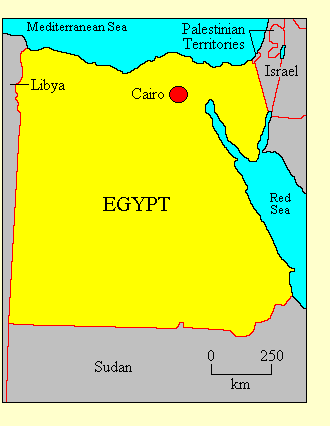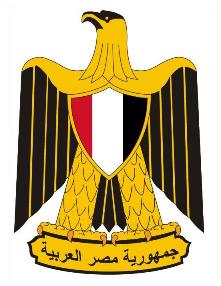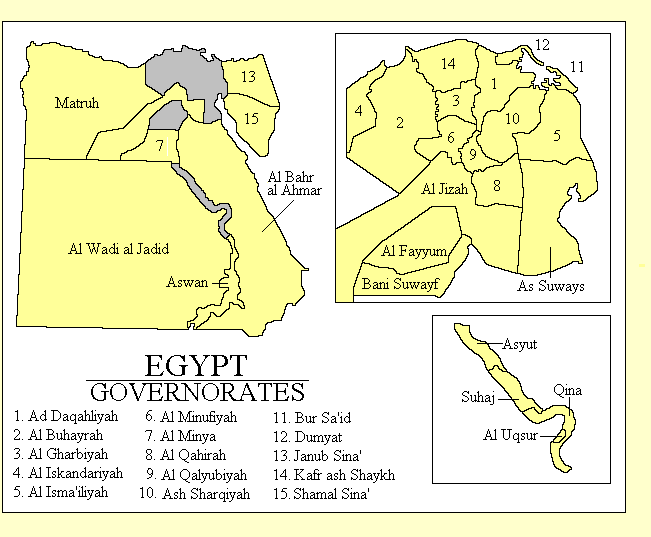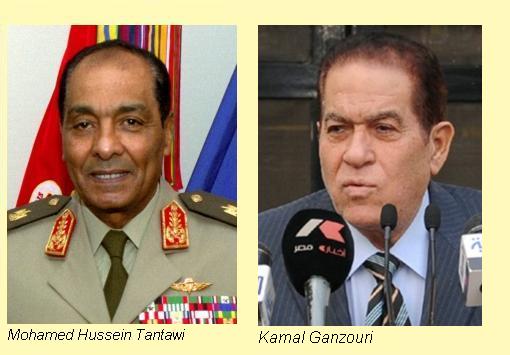

ARAB REPUBLIC OF EGYPT
Official name: Jumhuriyat Misr al-Arabiyah (Arab Republic of Egypt)
• Location: North Africa
• International organisations: African Union, Arab League, Non-Aligned Movement,
Organisation of Islamic Conference, United Nations, World Trade Organisation
• Borders: Israel, Libya, Palestinian Territories, Sudan
• Coastline: Mediterranean Sea, Red Sea
• Land area: 1,001,450 Km2
• Population: 77,400,000
• Annual GDP (PPP) per capita: US$6,000 (2009 CIA estimate). World ranking: 108
• Ethnicity: Egyptians, a Hamitic people, make up 99% of the
population. There are small Greek and Armenian minorities.
• Languages: Arabic is the official language and is universally understood.
• Religion: Sunni Moslem 94%, Coptic Christian 6% (by some estimates, up to 10 or 12%)
• Form of government: Provisional government, republic. Egypt is divided into 26 governorates.
• Capital: Cairo (al-Qahira)
• Constitution: The new
Provisional Constitution of the Arab Republic of Egypt was adopted on 30 March 30 2011.
• Head of state: The President, elected by the people through a two-round system to serve a six-year term.
• Head of government: The Prime Minister, appointed by the President. The Prime Minister will be accountable to
the People's Assembly.

• Legislature: Under the new Constitution the People's Assembly (Majlis al-Sha'ab) will have 498 members
elected for five-year terms, of whom 166 will be elected by absolute
majority vote for two-member districts, through a two-round system, and 332 members will be elected through a closed-list
proportional representation. The upper house, the Advisory Council (Majilis al-Shura) will have 264 members:
176 members elected for six-year terms by absolute majority vote through a two-round system, and 88 members are
appointed by the President.
• Electoral authority: The Supreme Electoral Committee
will administer the forthcoming legislative and presidential elections.
• Freedom House 2011 rating: Political Rights 6, Civil Liberties 5
• Transparency International Corruption Index: 31% (98 of 178 countries rated)
• Reporters Without Borders Press Freedom 2010 Index: 56.7% (127 of 178 countries rated)
• Heritage Foundation Economic Freedom 2010 Index: 59.1% (96 of 178 countries rated)
These ratings relate to the former Mubarak regime.
Political history
Egypt, a province of the Ottoman Empire from 1517, was brought under de facto British control in the 19th century.
In 1914 it became a British protectorate, and in 1922 it became officially an independent kingdom, though still under
British supervision. The British finally withdrew in 1946.
Under British rule and under the monarchy from 1946, parliamentary government was established, but real power was held
by the King. In 1952 there was a republican Army coup. In 1956 Gamal Abdel Nasser made himself dictator, establishing a
socialist one-party state. Nasser died in 1969 and was succeeded
by Anwar Sadat, who was assassinated by Islamic
radicals in 1981 and succeded by Hosni Mubarak. Mubarak maintained a facade of elections and parliamentary government while
allowing no serious opposition during his 30-year rule. In practice, the Army has ruled Egypt since 1952.

After the 2001
terrorist attacks on the United States, Mubarak came under pressure from the US to allow political liberalisation. In
response he announced in 2004 that there would be multi-party presidential and legislative elections in 2005. These
duly took place, although the main opposition force, the Muslim Brotherhood, remained illegal. Mubarak was re-elected with
only token opposition, but the legislative elections saw an increased number of anti-government independents (in fact
Brotherhood members) elected. At the subsequent election in 2010 the ruling party regained most of these seats.
In January 2011, following the successful revolution in Tunisia, demonstrations and riots broke out in Cairo and
other cities. After several weeks of mounting bloodshed, the Army withdrew support from Mubarak and he resigned on 11
February. The head of the Army, Field Marshal Mohamed Hussein
Tantawi became acting president. The military regime has promised the establishment of a civilian
democratic government, but has continued to rule in an arbitary way. It is not clear whether the Army is really prepared to
give up power. In December 2011 the regime appointed Kamal Ganzouri, a
popular reform Prime Minister under Mubarak, as Prime Minister in the interim government.
Since the fall of Mubarak, political parties have been legalised ahead of multi-stage elections in November and
December. The Freedom and Justice Party is a front for the Muslim Brotherhood.
The Light (al_Nour) party is a more extreme Islamist party. The New Centre Party or al-Wasat is also an Islamist party. The long-established
New Delegation (al-Waqf) is a secular liberal party. The Egyptian Bloc
(al-Kutla al-Misriyya) is also a secular party. By January 2012 it was clear that the Islamist parties would between them
win a large majority in the lower house.
Freedom House's 2011
report on Egypt
has been rendered out of date by the fall of the Mubarak regime.
Updated January 2012
|


